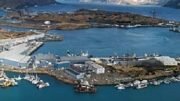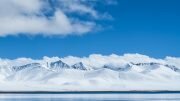This year, the sea ice in the Arctic has melted to the second-lowest level ever recorded.
During the last week, both Norwegian and American researchers have presented new figures showing the melting’s extent.
The data are slightly different, but both the Nansen Center in Bergen and the American NSIDC have similar expectations for 2020.
2012 is the only year when the sea ice has been less widespread during its low season.
Heatwave and fires
“It has been a wild year up north, with sea ice almost at a record low level, heat waves in Siberia, and massive forest fires,” NSIDC’s director Mark Serreze told the news agency AFP.
The trend of less and less ice both on land and on the water in the Arctic is in line with global warming.
“Although there was no new record this year, it is very worrying that the retreating and melting ice in the Arctic is not receiving much attention,” senior researcher Lasse H. Pettersson at the Nansen Center warned in a statement last week.
He also referred to the heatwave in Siberia, which contributed to the melting of ice.
This year, there has been exceedingly little ice north of the coast of Siberia and north of Svalbard.
“New nail in the coffin”
The sea ice in the Arctic decreases every year during the spring and summer before the sea begins to freeze again.
The turning point this year came last week, and the ice is now expanding.
The ice area spanned over 3.74 million square kilometers, according to the National Snow and Ice Data Center (NSIDC).
Satellite measurements of ice date back to 1979.
“We are on our way to a North Sea that will be ice-free parts of the year, and this year is a new nail in the coffin,” Serreze said.
“Political action needed”
The environmental organization Greenpeace is present at the so-called ice edge with a ship to document the sea ice level and research the ice edge zone.
“Our northern areas are among the places where the climate crisis is most visible, and where the warming process is fastest.
We need political action now to avoid the worst consequences of the climate crisis in the future, whether in the form of extreme ice melting or massive forest fires,” Laura Meller of Greenpeace said in a statement.
When there is less sea ice in the Arctic, more sunlight is absorbed by the sea, since water is darker than ice.
That is one of several natural mechanisms that help accelerate the global rise in temperature.
© NTB Scanpix / #Norway Today




Be the first to comment on "Arctic sea ice melts to second-lowest level ever recorded"